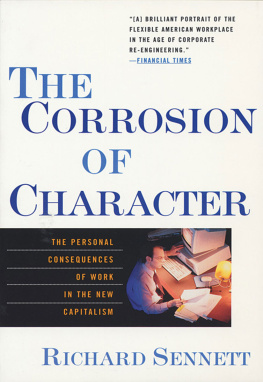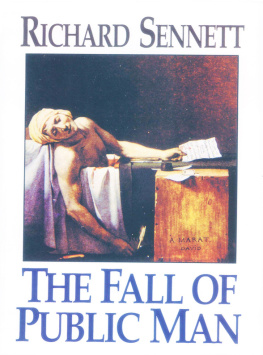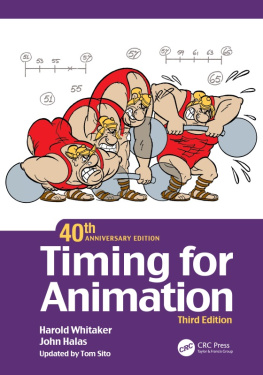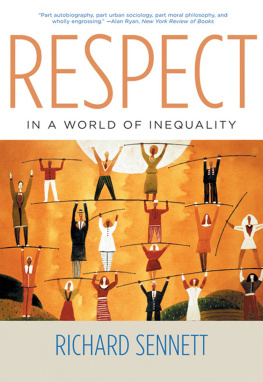Richard Sennett - The Fall of Public Man (40th Anniversary Edition)
Here you can read online Richard Sennett - The Fall of Public Man (40th Anniversary Edition) full text of the book (entire story) in english for free. Download pdf and epub, get meaning, cover and reviews about this ebook. year: 2017, publisher: W. W. Norton & Company, genre: Science. Description of the work, (preface) as well as reviews are available. Best literature library LitArk.com created for fans of good reading and offers a wide selection of genres:
Romance novel
Science fiction
Adventure
Detective
Science
History
Home and family
Prose
Art
Politics
Computer
Non-fiction
Religion
Business
Children
Humor
Choose a favorite category and find really read worthwhile books. Enjoy immersion in the world of imagination, feel the emotions of the characters or learn something new for yourself, make an fascinating discovery.

- Book:The Fall of Public Man (40th Anniversary Edition)
- Author:
- Publisher:W. W. Norton & Company
- Genre:
- Year:2017
- Rating:3 / 5
- Favourites:Add to favourites
- Your mark:
- 60
- 1
- 2
- 3
- 4
- 5
The Fall of Public Man (40th Anniversary Edition): summary, description and annotation
We offer to read an annotation, description, summary or preface (depends on what the author of the book "The Fall of Public Man (40th Anniversary Edition)" wrote himself). If you haven't found the necessary information about the book — write in the comments, we will try to find it.
The Fall of Public Man (40th Anniversary Edition) — read online for free the complete book (whole text) full work
Below is the text of the book, divided by pages. System saving the place of the last page read, allows you to conveniently read the book "The Fall of Public Man (40th Anniversary Edition)" online for free, without having to search again every time where you left off. Put a bookmark, and you can go to the page where you finished reading at any time.
Font size:
Interval:
Bookmark:
THE FALL
OF
PUBLIC MAN

RICHARD SENNETT

W. W. NORTON & COMPANY
Independent Publishers Since 1923
New York London
for
c.r.h.
Each person, withdrawn into himself, behaves as though he is a stranger to the destiny of all the others. His children and his good friends constitute for him the whole of the human species. As for his transactions with his fellow citizens, he may mix among them, but he sees them not; he touches them, but does not feel them; he exists only in himself and for himself alone. And if on these terms there remains in his mind a sense of family, there no longer remains a sense of society.
TOCQUEVILLE
Contents
THE FALL OF PUBLIC MAN

MODERN TIMES ARE OFTEN COMPARED TO THE YEARS THE ROMAN Empire went into decline: Just as moral rottenness is supposed to have sapped Romes power to rule the West, it is said to have sapped the modern Wests power to rule the globe. For all the silliness of this notion, it contains an element of truth. There is a rough parallel between the crisis of Roman society after the death of Augustus and present-day life; it concerns the balance between public and private life.
As the Augustan Age faded, Romans began to treat their public lives as a matter of formal obligation. The public ceremonies, the military necessities of imperialism, the ritual contacts with other Romans outside the family circle, all became dutiesduties in which the Roman participated more and more in a passive spirit, conforming to the rules of the res publica, but investing less and less passion in his acts of conformity. As the Romans public life became bloodless, he sought in private a new focus for his emotional energies, a new principle of commitment and belief. This private commitment was mystic, concerned with escaping the world at large and the formalities of the res publica as part of that world. This commitment was to various Near Eastern sects, of which Christianity gradually became dominant; eventually Christianity ceased to be a spiritual commitment practiced in secret, burst into the world, and became itself a new principle of public order.
Today, public life has also become a matter of formal obligation. Most citizens approach their dealings with the state in a spirit of resigned acquiescence, but this public enervation is in its scope much broader than political affairs. Manners and ritual interchanges with strangers are looked on as at best formal and dry, at worst as phony. The stranger himself is a threatening figure, and few people can take great pleasure in that world of strangers, the cosmopolitan city. A res publica stands in general for those bonds of association and mutual commitment which exist between people who are not joined together by ties of family or intimate association; it is the bond of a crowd, of a people, of a polity, rather than the bonds of family or friends. As in Roman times, participation in the res publica today is most often a matter of going along, and the forums for this public life, like the city, are in a state of decay.
The difference between the Roman past and the modern present lies in the alternative, in what privacy means. The Roman in private sought another principle to set against the public, a principle based on religious transcendence of the world. In private we seek out not a principle but a reflection, that of what our psyches are, what is authentic in our feelings. We have tried to make the fact of being in private, alone with ourselves and with family and intimate friends, an end in itself.
Modern ideas about the psychology of this private life are confused. Few people today would claim that their psychic life arises by spontaneous generation, independent of social conditions and environmental influences. Nevertheless, the psyche is treated as though it has an inner life of its own. This psychic life is seen as so precious and so delicate that it will wither if exposed to the harsh realities of the social world, and will flower only to the extent that it is protected and isolated. Each persons self has become his principal burden; to know oneself has become an end, instead of a means through which one knows the world. And precisely because we are so self-absorbed, it is extremely difficult for us to arrive at a private principle, to give any clear account to ourselves or to others of what our personalities are. The reason is that, the more privatized the psyche, the less it is stimulated, and the more difficult it is for us to feel or to express feeling.
The post-Augustan Romans pursuit of his private, Oriental gods was separated in his mind from the public world. He finally imposed those gods upon the public world, by subjugating military law and social custom to a higher, clearly different principle. Under the modern code of private meaning, the relations between impersonal and intimate experience have no such clarity. We see society itself as meaningful only by converting it into a grand psychic system. We may understand that a politicians job is to draft or execute legislation, but that work does not interest us until we perceive the play of personality in political struggle. A political leader running for office is spoken of as credible or legitimate in terms of what kind of man he is, rather than in terms of the actions or programs he espouses. The obsession with persons at the expense of more impersonal social relations is like a filter which discolors our rational understanding of society; it obscures the continuing importance of class in advanced industrial society; it leads us to believe community is an act of mutual self-disclosure and to undervalue the community relations of strangers, particularly those which occur in cities. Ironically, this psychological vision also inhibits the development of basic personality strengths, like respect for the privacy of others, or the comprehension that, because every self is in some measure a cabinet of horrors, civilized relations between selves can only proceed to the extent that nasty little secrets of desire, greed, or envy are kept locked up.
The advent of modern psychology, and of psychoanalysis in particular, was founded on the faith that in understanding the inner workings of the self sui generis, without transcendental ideas of evil or of sin, people might free themselves from these horrors and be liberated to participate more fully and rationally in a life outside the boundaries of their own desires. Masses of people are concerned with their single life-histories and particular emotions as never before; this concern has proved to be a trap rather than a liberation.
Because this psychological imagination of life has broad social consequences, I want to call it by a name that may at first seem inapt: this imagination is an intimate vision of society. Intimacy connotes warmth, trust, and open expression of feeling. But precisely because we have come to expect these psychological benefits throughout the range of our experience, and precisely because so much social life which does have a meaning cannot yield these psychological rewards, the world outside, the impersonal world, seems to fail us, seems to be stale and empty.
In a sense, I am turning around the argument David Riesman made in The Lonely Crowd. Riesman contrasted an inner-directed society, in which men pursued actions and made commitments based on goals and sentiments they felt within themselves, to an other-directed society, in which these passions and commitments depend on what people sense to be the feelings of others. Riesman believed American society, and in its wake Western Europe, was moving from an inner- to an other-directed condition. The sequence should be reversed. Western societies are moving from something like an other-directed condition to an inner-directed conditionexcept that in the midst of self-absorption no one can say what is inside. As a result, confusion has arisen between public and intimate life; people are working out in terms of personal feelings public matters which properly can be dealt with only through codes of impersonal meaning.
Next pageFont size:
Interval:
Bookmark:
Similar books «The Fall of Public Man (40th Anniversary Edition)»
Look at similar books to The Fall of Public Man (40th Anniversary Edition). We have selected literature similar in name and meaning in the hope of providing readers with more options to find new, interesting, not yet read works.
Discussion, reviews of the book The Fall of Public Man (40th Anniversary Edition) and just readers' own opinions. Leave your comments, write what you think about the work, its meaning or the main characters. Specify what exactly you liked and what you didn't like, and why you think so.










